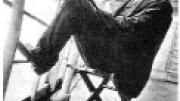Just short of 60 and deeply in debt because of his failed publishing firm, Samuel Clemens set out from Elmira, New York, in July 1895 on a worldwide performance tour. Robert Cooper '53, L '56, an American retired professor at Hebrew University in Jerusalem, retraced Clemens's route as part of his research for Around the World with Mark Twain(Arcade Publishing, $27.95). It is an engaging amalgam of travel writing, history, and character study. (In India Clemens hired a servant, whom he greatly liked. The servant's name was Mousa, but Clemens felt the name didn't suit the man and asked and got permission to call him "Satan.")
Early in Satan's tenure, he announced a visitor to Clemens: "God want to see you." Although Clemens may have invented the announcement, he did indeed receive a personage viewed by millions as a god. This was His Highness, Aga Khan III, spiritual leader of the Ismaili Muslims, a descendant of the Prophet, and a grandson of the Shah of Persia.
Clemens's visitor had received a religious education by Muslim clerics and a modern secular education by English tutors, who introduced him to English literature, in which he read widely and from which he could recite whole passages by heart. Also well read in the classical Persian poets, he knew French, German, Urdu, and Hindustani in addition to English and modern Persian. He became Imam when he was eight years old. By 10 he was arbitrating religious disputes. By 16 he had taken over the Imamate's practical administration. He was only 18 when he called on Clemens, but such was his gravitas that Clemens remembered him as "not 40, perhaps not above 35 years old."
The Aga Khan became a pro-British mediating force between Muslims and Hindus, president of the All-India Muslim League, an important player in the London Round Table Conferences on Indian constitutional reform in the early 1930s, and president of the League of Nations. Today those of the general public old enough to remember him recall a stout, stupendously rich owner and breeder of racehorses (he won the Derby five times) and a religious leader whose followers weighed him in public, once on his golden jubilee (1936), when they gave him his weight in gold, and once on his diamond jubilee (1946), when they gave him his weight in diamonds. (He presented both gifts to charitable and public works.)
Clemens described him as "a most courteous and charming gentleman," who "wears his immense honors with tranquil grace, and with a dignity proper to his awful calling." His Highness, Clemens reported, mentioned the philosophy of Huck Finn and then "went luminously on with the construction of a compact and nicely discriminated literary verdict." He remained, Clemens recalled, a half hour.
Writing more than half a century later, the Aga Kahn remembered spending a whole afternoon with Clemens and then dining with him at Watson's Hotel. "He had a pleasant, utterly unassuming charm," wrote the Aga Khan, "and a friendliness of manner which captivated the serious-minded lad that I was...He seemed to me dear, gentle and saintly, sad and immensely modest for so great and famous a genius. He reminded me of one of those delicate white flowers, so sensitive that when you touch them they recoil and fold their clear, waxen petals, as if too shy and retiring to tolerate the slightest probe."






